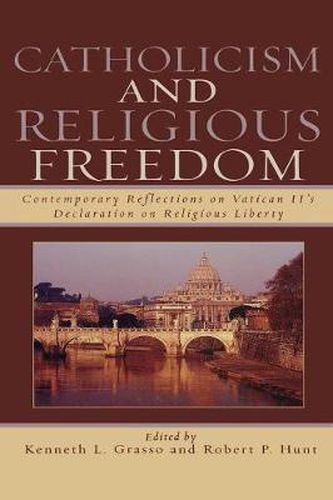Readings Newsletter
Become a Readings Member to make your shopping experience even easier.
Sign in or sign up for free!
You’re not far away from qualifying for FREE standard shipping within Australia
You’ve qualified for FREE standard shipping within Australia
The cart is loading…






The late Pope John Paul II frequently invoked Dignitatis Humanae as one of the foundational documents of contemporary Church social teaching. In this timely new edited collection, Catholicism and Religious Freedom: Contemporary Reflections on Vatican II’s Declaration on Religious Liberty, Kenneth L. Grasso and Robert P. Hunt have assembled an impressive group of scholars to discuss the current meanings of one the Vatican’s most important documents and its place in the Church. Dignitatis Humanae understands itself as bringing ‘forth new things that are in harmony with the old.’ Today, forty years after its publication, the precise nature of these ‘new things’ and their relationship to ‘the old’ remain among the most important pieces of unfinished business confronting Catholic social thought. The theological issues brought forth in Dignitatis Humanae go to the heart of the contemporary debate about the nature, foundation, and scope of religious liberty. Here, the contributors to this volume give these considerations the serious and sustained attention they deserve.
$9.00 standard shipping within Australia
FREE standard shipping within Australia for orders over $100.00
Express & International shipping calculated at checkout
The late Pope John Paul II frequently invoked Dignitatis Humanae as one of the foundational documents of contemporary Church social teaching. In this timely new edited collection, Catholicism and Religious Freedom: Contemporary Reflections on Vatican II’s Declaration on Religious Liberty, Kenneth L. Grasso and Robert P. Hunt have assembled an impressive group of scholars to discuss the current meanings of one the Vatican’s most important documents and its place in the Church. Dignitatis Humanae understands itself as bringing ‘forth new things that are in harmony with the old.’ Today, forty years after its publication, the precise nature of these ‘new things’ and their relationship to ‘the old’ remain among the most important pieces of unfinished business confronting Catholic social thought. The theological issues brought forth in Dignitatis Humanae go to the heart of the contemporary debate about the nature, foundation, and scope of religious liberty. Here, the contributors to this volume give these considerations the serious and sustained attention they deserve.